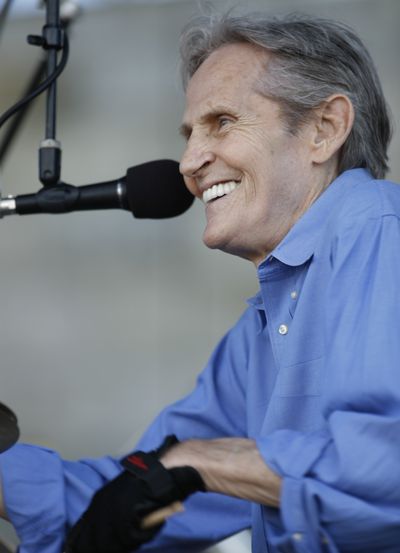The Band singer, drummer dies at 71
Helm, a cotton farmer’s son, joined unique group as a teen

ALBANY, N.Y. – With songs like “The Night They Drove Old Dixie Down,” “The Weight” and “Up on Cripple Creek,” The Band fused rock, blues, folk and gospel to create a sound that seemed as authentically American as a Mathew Brady photograph or a Mark Twain tale.
In truth, the group had only one American: Levon Helm.
Helm, the drummer and singer who brought an urgent beat and a genuine Arkansas twang to some of The Band’s best-known songs and helped turn a bunch of musicians known mostly as Bob Dylan’s backup group into one of rock’s most legendary acts, has died. He was 71.
Helm, who was found to have throat cancer in 1998, died Thursday of complications from cancer at Memorial Sloan-Kettering Cancer Center in New York City.
Helm and his bandmates – Canadians Rick Danko, Garth Hudson, Robbie Robertson and Richard Manuel – were musical virtuosos who returned to the roots of American music in the late 1960s as other rockers veered into psychedelia, heavy metal and jams. The group’s 1968 debut, “Music from Big Pink,” and its follow-up, “The Band,” remain landmark albums of the era.
Early on, The Band backed Dylan on his sensational and controversial electric tours of 1965-’66 and collaborated with him on the legendary “Basement Tapes,” which produced “I Shall Be Released,” “Tears of Rage” and other favorites.
Born the son of an Arkansas cotton farmer on May 26, 1940, Helm was just out of high school when he joined rocker Ronnie Hawkins for a tour of Canada in 1957 as the drummer for the Hawks. That band eventually recruited a group of Canadian musicians who, along with Helm, spent grueling years touring rough bars in Canada and the South.
They would split from Hawkins, hook up with Dylan and eventually call themselves The Band – because, as they explained many times, that’s what everyone called them anyway.
In some ways, The Band was the closest this country ever came to the camaraderie and achievement of the Beatles. Each of the five members brought special talents that through years of touring, recording and living together blended into a unique sound.
But the group, especially Manuel, struggled with drugs and alcohol. While Danko and Manuel shared songwriting credits in the early years, Robertson was essentially the lone writer for the last few albums. By the middle of the 1970s, Robertson, especially, was burned out and wanted to get off the road.
They bid farewell to live shows with a bang with the famous “Last Waltz” concert in 1976. Eric Clapton, Neil Young, Joni Mitchell and Dylan were among the stars who played the show in San Francisco, filmed by Martin Scorsese for a movie of the same name.
Helm pursued a solo career with a string of albums. Gathering associates for a group he branded “The RCO All-Stars,” he worked with soul, R&B and blues musicians Paul Butterfield, Dr. John, and Booker T. Jones and two members of his group the MG’s, Steve Cropper and Donald “Duck” Dunn.
He established a second profession as an actor, starting with his role as country singer Loretta Lynn’s father in the 1980 biopic “Coal Miner’s Daughter,” and put his Arkansas drawl to work as narrator of the 1983 film adaptation of Tom Wolfe’s book about the U.S. space program, “The Right Stuff.”